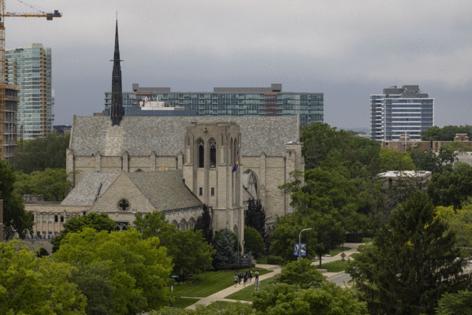Final day to file claims in class-action lawsuit alleging tuition overcharging by top universities
Published in News & Features
College students seeking reward in the settlement of a class-action lawsuit against several elite universities accused of violating anti-trust laws by colluding in a tuition “price-fixing cartel” have until Wednesday morning, just before 2 a.m., to submit their claims to receive payment.
Northwestern University and the University of Chicago are among the ten universities that settled a 2022 class-action anti-trust lawsuit filed in federal court alleging they illegally overcharged students for tuition and conspired to limit their financial aid packages. The lawsuit alleges that this resulted in universities offering less financial aid to students than they would have in a fully competitive environment.
U.S. antitrust laws allow higher education institutions to work together to come up with financial aid awards for applicants, but applying for financial aid is not supposed to have any impact on the university’s admissions decision, according to the 568 Exemption, a section of the Improving America’s Schools Act of 1994.
The universities involved in the claim have said that these claims are without merit, asserting that their financial aid policies were legal and “pro-competitive” and that they did not unjustly reduce their financial aid awards.
Several universities named in the class-action lawsuit have reached settlement agreements for a combined total of $284 million. Locally, the University of Chicago agreed to pay $13.5 million to settle in 2023. In February, Northwestern agreed to pay $43.5 million.
Universities that settled will provide payment to current and former students from Fall 2003 through the date the court approves the settlement. This will include students who received need-based financial aid from one or more of the defendants and whose tuition, fees, room, or board were not fully covered by any combination of financial or merit-based aid, excluding loans.
A similar lawsuit involving Northwestern University, 40 other universities, and the College Board was filed in federal court in Chicago in October. It alleges that dozens of universities illegally overcharged students for tuition, violating federal antitrust laws.
The lawsuit alleges that the universities and the College Board jointly worked to require noncustodial parents — the parents with whom students don’t live most of the time — to provide their financial information on financial aid applications.
The College Board, which helps promote college readiness for students through standardized testing and college-level classes, then requires schools to consider the sum provided for financial aid allotment, regardless of the noncustodial parent’s actual financial assistance. This increased the cost of tuition for students by about $6,200, according to the lawsuit.
“Students were told there were no exceptions to the requirement – even if a divorce court order was issued concerning college expenses,” the lawsuit states. The student would receive an estimate for family contribution to determine financial aid based on both parents’ incomes, regardless of whether both parents would be contributing to the student’s education.
Those eligible can submit a claim form via Financial Aid Antitrust Settlement’s submit claim page or print the form from the website and mail it to the address provided. All forms must be submitted online or postmarked by Wednesday at 1:59 CST.
_____
(The Tribune’s Talia Soglin and Zareen Syed contributed.)
_____
©2024 Chicago Tribune. Visit chicagotribune.com. Distributed by Tribune Content Agency, LLC.







Comments